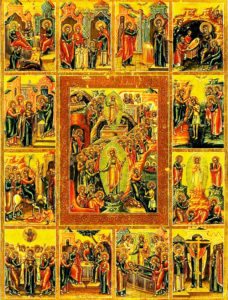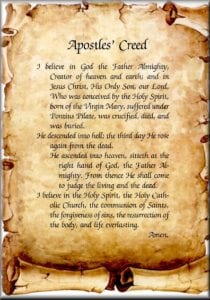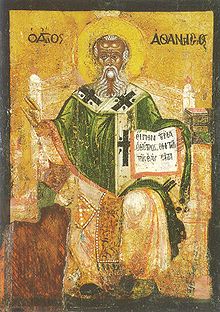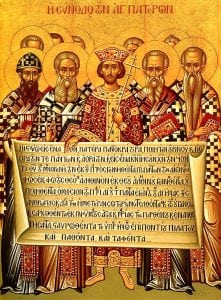Our Catholic creed captures the essence of our faith and the truths that are at the heart of Catholic Church teachings. The Catholic creed is as relevant today as it was in the formative years of the church. To better appreciate the importance of our Catholic creed we need to understand what it really is.
What is a Creed?
The word creed is anglicized from “credo,” a Latin word that means “I believe.” During its formative years, the Catholic Church developed statements of beliefs as a guide for their threefold ministry.
“Go, therefore, and make disciples of all nations, baptizing them in the name of the Father, and of the Son, and of the holy Spirit, teaching them to observe all that I have commanded you. And behold, I am with you always, until the end of the age.”
- Matthew 28:19-20
This threefold ministry of the church is based on the command that Jesus gave to his disciples at the end of the gospel of Matthew. This command is also known as the Great Commission and through it Jesus instructs us to:
- Make disciples of all nations
- Baptize them in the name of the Father, and of the Son and of the Holy Spirit
- Teaching them to observe all that I have commanded you.
The early church created statements that corresponded with its threefold ministry. These statements proclaimed Jesus’ identity as well as the great sacrifice He did for humanity. In its baptizing efforts, the church would profess God as Father, Son and Holy Spirit.
Last but not the least, the church’s mission to teach included proclamations of Jesus’ instructions and teachings about faith.
Why Do We Need a Catholic Creed?
In the past, the creeds were an important way for the church to instill its mission and help Christians fulfill their duties. The Catholic creed serves the same purpose today. It summarizes the central truths of our faith and it symbolizes the faith of the whole church. When we recite the creed, we proclaim both our individual identity in Christ and our identity as a part of the whole church.
We need to keep in mind that the creed is not meant to replace our personal faith. Rather, it gives substance to our faith. Reciting the different Catholic creeds is a wonderful way for us to remember our salvation and affirm our faith.
Aside from being a personal proclamation of our Catholic beliefs, the creed guides us in the way we must live as Christians. We can think of our Catholic creed as a map for navigating through the real world. It helps us stay within the righteous path and stops us from going astray.
The Apostle’s Creed
The Apostle’s Creed is perhaps one of the most well-known Catholic creed and is a summary of the apostles’ faith. Sometimes called the Symbol of the Apostles, it is an early statement of Christian belief and has been used by Christians since the fourth century.
The Apostle’s Creed emphasizes twelve important principles that are taught in the New Testament. These are:
- God is our creator and father so we can count on Him to love and protect us.
- Jesus is our Lord so our lives are not our own.
- Jesus was conceived by the Holy Spirit through Mary and so He is sinless from birth.
- Jesus lived a righteous life and died to save us from our sins.
- Jesus resurrected from the dead and reminds us that we, too, will be resurrected to live in eternity with the Father.
- Jesus ascended into heaven and intercedes on our behalf.
- Jesus will return to pass judgment upon the world.
- The Holy Spirit, as part of the Holy Trinity, united us to Jesus Christ.
- There is one universal church and God has and always gather and protect His church.
- We are part of the communion of saints and so we must care for one another as members of God’s family.
- We have been forgiven of our sins through Christ.
- We will be resurrected to join God in eternity.
The Athanasian Creed
The Athanasian Creed is an early summary of Christian doctrine. The authorship is often attributed to Athanasius, the archbishop of Alexandria, who lived in the 4th century A.D., hence the name.
Since ancient times, the church has been bombarded with heresies and one of the most common one attacks the divinity and personhood of Jesus Christ. The Athanasian Creed refutes this false teaching and emphasizes the importance of having a Trinitarian belief in God.
In other words, all members of the Holy Trinity are uncreated, co-eternal and of the same substance. Through the Athanasian Creed, we are reminded that Jesus is part of the Holy Trinity and that his incarnation did not change his divine nature into a human one.
The Nicene Creed
The Nicene Creed is another common Catholic creed. This profession of faith is part of Mass and is recited at the start of Liturgy of the Eucharist and after the reading of the gospel and homily.
The Nicene Creed emphasizes many of the fundamental tenets of our faith. Its core affirmations include its statement of belief in the immortality of the soul, resurrection and forgiveness of sins through the baptismal process.
Aside from its religious and spiritual relevance, the Nicene Creed is also historically significant because it reflects the issues raised in the First Council of Nicaea in 325. During that time, many heresies were spread and of them was the doctrine of Arianism which refutes the divinity of Jesus Christ. The Council of Nicaea was convened to address this controversy.
Why do you consider the Catholic creeds important? How do you apply its teachings in your personal life?




